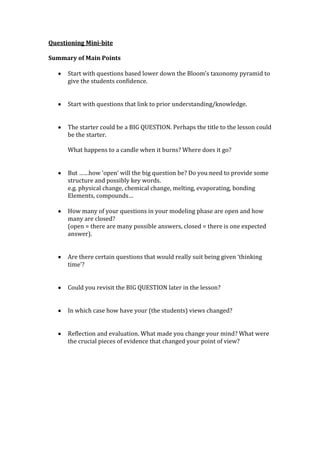Report
Share

Recommended
What is thinking & higher order thinking?
How to improve higher order thinking?
Why do we ask questions?
Principles of questioning
Strategies to use when student respond?
Strategies to use when student don’t respond
Strategies for responding to student questionsQuestioning techniques: The heart of Higher Order Thinking

Questioning techniques: The heart of Higher Order ThinkingSargodhains' Institute for Professional Development
Recommended
What is thinking & higher order thinking?
How to improve higher order thinking?
Why do we ask questions?
Principles of questioning
Strategies to use when student respond?
Strategies to use when student don’t respond
Strategies for responding to student questionsQuestioning techniques: The heart of Higher Order Thinking

Questioning techniques: The heart of Higher Order ThinkingSargodhains' Institute for Professional Development
More Related Content
Similar to Questioning mini bite 2
Similar to Questioning mini bite 2 (20)
8 DEVELOPING AND NURTURING INTERESTING AND RESEARCHABLE IDEAS

8 DEVELOPING AND NURTURING INTERESTING AND RESEARCHABLE IDEAS
Questioning techniques: helping learners develop higher prder thinking skills

Questioning techniques: helping learners develop higher prder thinking skills
Handout -critical_thinking_-_teaching_methods_and_strategies (1)

Handout -critical_thinking_-_teaching_methods_and_strategies (1)
Chapter 4_ Inviting Uncertainty_How can we grow a culture of questioning and ...

Chapter 4_ Inviting Uncertainty_How can we grow a culture of questioning and ...
More from jorawlings
More from jorawlings (20)
Questioning mini bite 2
- 1. Questioning Mini-bite Summary of Main Points Start with questions based lower down the Bloom’s taxonomy pyramid to give the students confidence. Start with questions that link to prior understanding/knowledge. The starter could be a BIG QUESTION. Perhaps the title to the lesson could be the starter. What happens to a candle when it burns? Where does it go? But ……how ‘open’ will the big question be? Do you need to provide some structure and possibly key words. e.g. physical change, chemical change, melting, evaporating, bonding Elements, compounds… How many of your questions in your modeling phase are open and how many are closed? (open = there are many possible answers, closed = there is one expected answer). Are there certain questions that would really suit being given ‘thinking time’? Could you revisit the BIG QUESTION later in the lesson? In which case how have your (the students) views changed? Reflection and evaluation. What made you change your mind? What were the crucial pieces of evidence that changed your point of view?